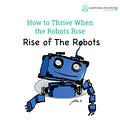There's a lot of excitement about artificial intelligence (AI) and the potential for robots to autonomously make decisions about what gets done, how it gets done, and who does it. As the technology fast approaches the dreams of science fiction, many professionals, blue and white colour workers are beginning to fear a future where their own jobs are no more. Will you be one who is replaced, or will you be one of those who thrives? The new Luddism In a fit of rage against the machines, Ned Ludd was an apprentice textile worker who allegedly smashed two stocking frames, a mechanical knitting machine, in 1779. The act spawned the Luddite movement whose members disliked the new technological devices and the changes being brought about by the Industrial Revolution. In 1812, the Luddite movement was a small militant force, battling the British army in Middleton, Lancashire. They met at night on the moors surrounding industrial towns to practice drills and manoeuvres. The Luddites employed tactics that today we would call terrorism and they were driven by a powerful cause: to save their jobs and improve their wretched standard of living. And they blamed the new machines in large part for their suffering. Today, we face a new challenge: The rise of the robots. Technological advances in the 19th and 20th centuries mainly displaced uneducated labourers. Today, we are seeing technology increasingly threaten skilled worker's jobs as well. Today, you may well have good reason to be concerned about the rise of the robots. I realised recently, that I hadn't actually spoken to, or needed to speak to, anyone in my bank for more than two years. Financial services have been at the forefront of digital adoption and transformation and many lower-level (those less cognitvely demanding) positions have already simply disappeared. In energy and mining, AI enables companies to tap new reserves and increase extraction and production efficiency. Predictive, manual work in both industries is no longer needed and the physical skills of old, is already or will soon be redundant. In healthcare, automation and AI has already changed the interaction between patients and healthcare professionals. But the good news for carers is that demand for their services is likely to grow, but if you work the back office, it could be time to look elsewhere. Manufacturing is seeing a new wave of AI and automation further disrupting production functions in factories. Two years ago, Foxconn replaced 60,000 workers with robots in one factory. The retail sector is rapidly dying a death on the high street and jobs replaced by machines increase daily. Whether it be the self-checkout of today, or the automated RFID or similar tech of tomorrow. And who needs physical shops and humans in them anyway when Amazon can deliver later this afternoon? Real Estate Agents are unlikely to be missed by those not in the profession, but what will they do once their job is done by a 'bot? Support services in organisations are threatened too. Do you really need accountants when the rules are established? Once you have the policies and procedures in place, how many people do you need in HR? Supply chain professionals are replacing themselves rapidly**. Customer Service** has shifted to self-serve portals and voice prompts recorded once and played in evermore annoying menus of choices. True, many other jobs open up, but with completely different skill requirements. Cybersecurity seems unlikely to stop growing - indeed, half of the battle is against malevolent AI bots. Rise of the Robots (book) - Wikipedia Skill shift: Automation and the future of the workforce The good news is that we'll still need humans to manage and lead and do the more complex cognitive thinking. For now, anyway. Sure, one day AI could evolve to higher levels of quasi-cognitive functioning and make better decisions than human managers and leaders. And there are things that you can do, right now, to significantly improve your valu
Share this post

LA 074: How to Thrive When the Robots Rise
www.joyatwork.coach
LA 074: How to Thrive When the Robots Rise
Aug 31, 2018
Joy@Work Podcast
Helping marketplace leaders #UnStuck their true potential to thrive in life and leadership to build a successful, sustainable business with collaborative, high performance teams and Joy@Work with practical, neuroscience-based AdvantEdge Guides and coaching.
Helping marketplace leaders #UnStuck their true potential to thrive in life and leadership to build a successful, sustainable business with collaborative, high performance teams and Joy@Work with practical, neuroscience-based AdvantEdge Guides and coaching.Listen on
Substack App
RSS Feed
Recent Episodes














LA 074: How to Thrive When the Robots Rise